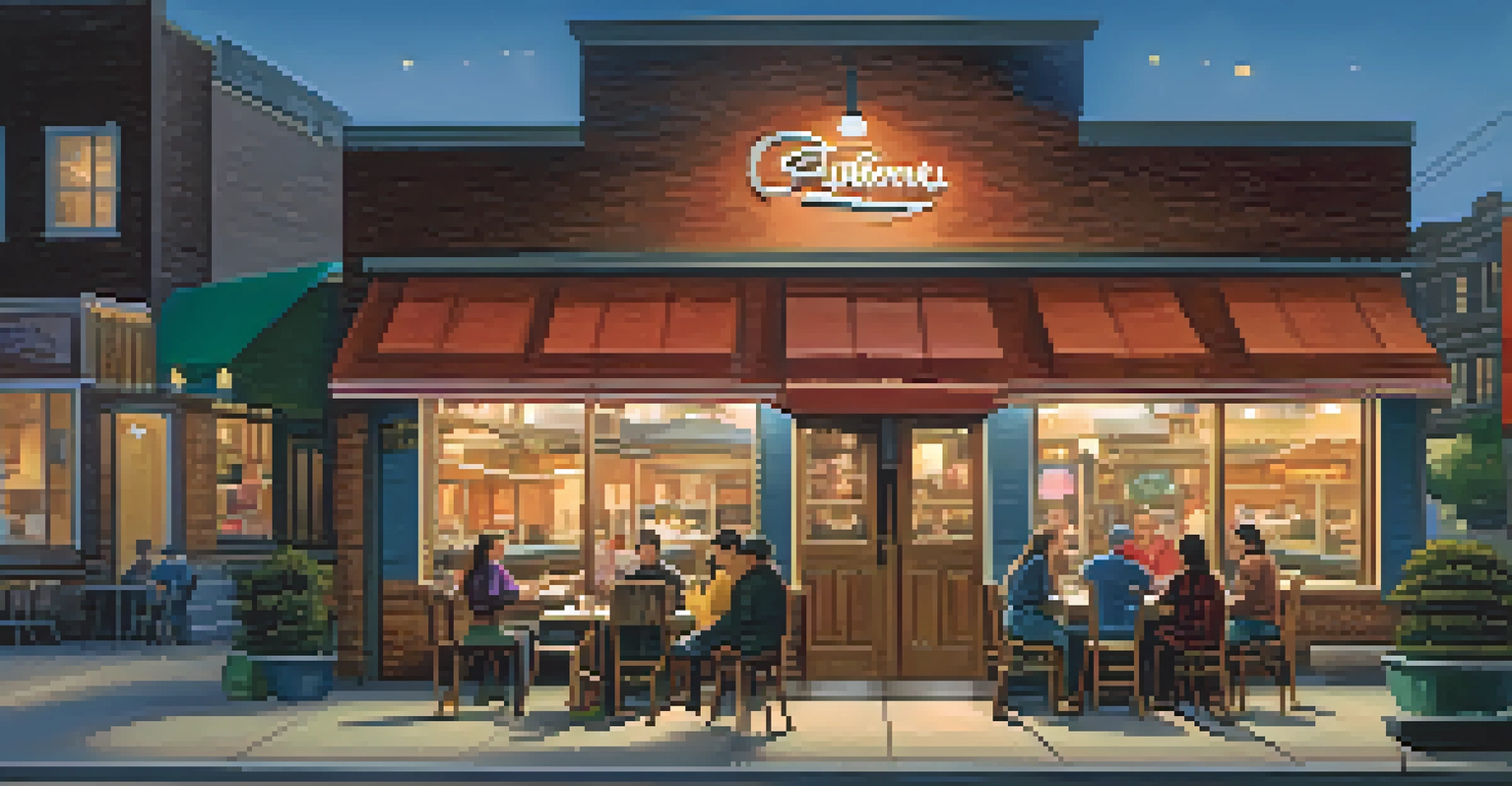The Role of Immigrant Communities in Illinois' Identity

Historical Context of Immigration in Illinois
Illinois has a rich history of immigration that dates back to the 19th century. Waves of immigrants from Europe, Asia, and Latin America have settled in the state, each bringing unique cultures and traditions. This diverse influx has shaped not only the economic landscape but also the social fabric of Illinois.
Immigrants aren’t just part of the workforce. They are integral to our culture, our economy, and our future.
The arrival of these communities often coincided with industrial growth, particularly in cities like Chicago. As factories opened and jobs became available, immigrants flocked to the area, seeking opportunities for a better life. This historical backdrop lays the foundation for understanding the contemporary role of these communities.
Today, the legacy of these early immigrants is evident in the neighborhoods, festivals, and cuisine that define Illinois. From Little Italy to Chinatown, the marks of diverse cultures are a testament to the state’s immigrant roots and ongoing evolution.
Cultural Contributions of Immigrant Communities
Immigrant communities have significantly enriched Illinois' cultural landscape. Festivals, music, and art from various cultures blend together, creating a vibrant tapestry that reflects the state's diversity. For example, events like the Chicago Air and Water Show and the Puerto Rican Festival showcase the unique traditions of different groups.

Food is another vital avenue through which immigrant communities contribute to Illinois' identity. From deep-dish pizza to tacos and pho, the culinary scene offers a delicious representation of the state's multiculturalism. Local restaurants often serve as hubs, bringing together people from various backgrounds to enjoy and celebrate these flavors.
Immigrants Shape Illinois' Culture
The diverse cultural contributions of immigrant communities enrich Illinois through festivals, cuisine, and shared traditions.
Through these cultural contributions, immigrant communities not only preserve their heritage but also foster a sense of belonging. This shared experience helps build bridges between different groups, creating a more inclusive Illinois.
Economic Impact of Immigrant Communities
Immigrants play a crucial role in Illinois' economy, driving growth and innovation across various sectors. They fill essential jobs in industries like healthcare, construction, and technology, often taking on roles that are difficult to fill. This labor force is vital for sustaining the state's economy and ensuring its competitiveness.
Diversity is not a reason for fear, but a reason for celebration.
Moreover, immigrant entrepreneurs contribute significantly to the local economy by starting businesses. These ventures not only create jobs but also enhance the diversity of products and services available to residents. Neighborhoods often thrive around these businesses, fostering community and economic interdependence.
In essence, the economic contributions of immigrant communities are indispensable for Illinois. Their resilience and entrepreneurial spirit exemplify the American Dream, showcasing how diverse backgrounds can come together to create a prosperous future.
Challenges Faced by Immigrant Communities
Despite their significant contributions, immigrant communities in Illinois face numerous challenges. Issues such as language barriers, access to education, and legal status can hinder their ability to fully integrate into society. These obstacles can create feelings of isolation and limit opportunities for growth.
Additionally, discrimination and xenophobia can further exacerbate the difficulties faced by these communities. Negative stereotypes and misconceptions often lead to social exclusion, making it harder for immigrants to feel welcomed and valued. Addressing these challenges is crucial for fostering a more inclusive environment.
Economic Role of Immigrants
Immigrants drive economic growth in Illinois by filling essential jobs and launching businesses that enhance local economies.
Community organizations and advocacy groups play a key role in addressing these issues. By providing resources and support, they empower immigrants to overcome barriers and thrive in their new home. This collaborative effort is essential for building a stronger, more cohesive Illinois.
The Role of Immigrants in Shaping Politics
Immigrants have increasingly become a vital force in Illinois' political landscape. Their numbers and voices can influence policy decisions, particularly on issues related to immigration, labor rights, and social justice. By participating in local elections and advocacy, they ensure their concerns are heard.
Political representation has also improved, with more immigrant leaders emerging in various levels of government. These individuals bring unique perspectives to the table, helping to shape policies that reflect the diverse needs of the community. Their presence is a testament to the increasing recognition of immigrant contributions.
As Illinois continues to evolve, the political engagement of immigrant communities will be essential. Their involvement not only empowers their own communities but also fosters a more representative democracy for all residents.
Educational Contributions of Immigrant Communities
Education is a cornerstone for many immigrant families in Illinois, serving as a pathway to opportunity and success. Immigrant communities often prioritize education, instilling values of hard work and perseverance in their children. This commitment has led to remarkable achievements in academic performance across various demographics.
Schools in Illinois are increasingly becoming microcosms of global cultures, thanks to the diverse student population. Programs that celebrate multiculturalism not only enrich the learning experience but also promote understanding and respect among students from different backgrounds. This diversity prepares students to thrive in a globalized world.
Challenges for Immigrant Integration
Despite their contributions, immigrant communities face challenges such as discrimination and access to resources, impacting their integration.
Moreover, immigrant families often engage in community educational initiatives, such as tutoring and mentorship programs. These efforts help bridge gaps and support children in their academic journeys, fostering a sense of unity and collaboration among families from various backgrounds.
Future Prospects for Immigrant Communities in Illinois
Looking ahead, the future of immigrant communities in Illinois is filled with potential and promise. As the state continues to diversify, the contributions of these communities will play an integral role in shaping its identity. Their resilience and adaptability will be key in navigating the challenges and opportunities that lie ahead.
Emerging trends, such as entrepreneurship and technological innovation, present new avenues for growth and development. Immigrant communities are poised to lead in these areas, leveraging their unique perspectives to drive change and create economic opportunities. This dynamic will further enhance Illinois' reputation as a hub for innovation.

Ultimately, the ongoing integration and empowerment of immigrant communities will be crucial for Illinois' future. By embracing diversity and fostering an inclusive environment, the state can continue to thrive as a vibrant mosaic of cultures and identities.